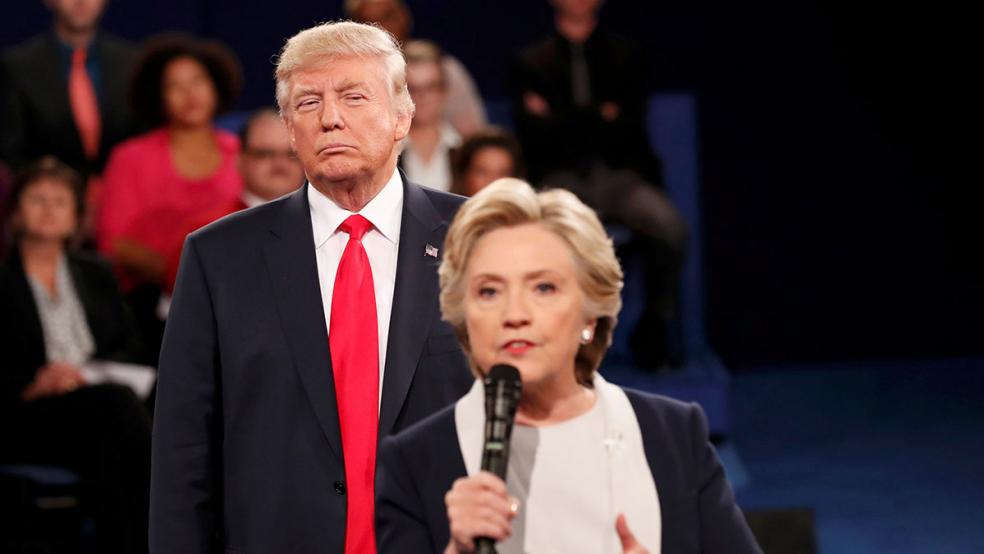A subtle way of matching the words an opponent uses during a debate may give presidential candidates a bump in the polls, researchers say.
The findings are based on a review of US presidential debates between 1976 and 2012.
Related: Vegas, Baby! All the Weird Stuff You Can Bet on for Tonight’s Trump-Clinton Debate
“Linguistic style matching,” says a University of Michigan professor who led the study, has nothing to do with tone, cadence, or the number of times one candidate interrupts the other. Nor is it about content—the nouns and regular verbs that make up “what” a speaker says.
It’s much more subtle. Linguistic style matching zeroes in on so-called function words that reflect how a speaker is making a point. It refers to conjunctions like “also,” “but,” and “unless;” quantifiers like “all,” “remaining,” and “somewhat;” and other supporting parts of speech.
“These function words are inherently social, and they require social knowledge to understand and use,” says study author Daniel Romero, an assistant professor in the University of Michigan School of Information, as well as in computer science and engineering. “We think that matching an opponent’s linguistic style shows greater perspective taking and also makes one’s argument’s easier to understand for third-party viewers.”
These 444 words
The researchers obtained transcripts of 26 debates from 36 years of presidential campaign seasons, going back to Jimmy Carter and Gerald Ford. They looked at the degree to which each candidate linguistically matched the other in eight different style markers through rounds of questions (one of the reasons the team chose to analyze debates is because candidates take turns being the first to answer the moderator).
Related: Debate Night: Get Ready for Donald Trump’s Last Political Reality Show
The eight style markers they evaluated amount to 444 words: quantifiers, conjunctions, adverbs, auxiliary verbs, prepositions, articles, personal pronouns and impersonal pronouns. Examples include “about,” “especially,” “perhaps,” “must,” “might,” “these,” and “our.”
Each candidate in each debate was given a score for how closely they matched their opponent’s linguistic style according to these parameters, when their opponent had been the first to speak.
Then the team examined Gallup polls and meshed the data. They found that linguistic style matchers gained a median of one point. And those that didn’t match lost a median of one percentage point in the polls.
“We already knew a lot about how linguistic matching can affect a relationship between two people. It can lead to better outcomes for negotiators, for example. In this case, we were interested in something different,” Romero says. “And that’s when a third person is watching the exchange and judging who is doing a better job. We didn’t know a lot about that before.”
The outcome didn’t surprise Romero.
“We think linguistic style matching is linked to processing fluency and if that’s the case, it helps the third person have an easier time understanding the candidate’s response,” he says.
Doesn’t mean they’ll win
No candidate over the years stood out as being a supreme style matcher. Some did well in particular debates, only to get low marks in others against the same opponent. And poll data didn’t always correlate with election outcomes.
For example, Gerald Ford received a positive linguistic style matching score of .02 in the ’76 election’s first debate. His poll numbers spiked 6.5 percentage points. In contrast, Carter’s linguistic matching score was -.53. He was not adept in that case at mirroring how Ford made his points. Carter’s poll numbers dropped by 2 points. But it was Carter who prevailed in November.
As election nears, candidate language gets simpler
In contrast, the first debate of 2000 turns out to have predicted the White House inhabitant. George W. Bush matched Al Gore well, for a score of 1.43. He rose two percentage points in the polls. Gore, on the other hand, got a negative matching score of -0.41. He fell in the polls by three points.
The study appears in the Personality and Social Psychology Bulletin. The Northwestern Institute on Complex Systems, the Army Research Laboratory, and the Defense Advanced Research Projects Agency funded the work. Also collaborating on the study are researchers at INSEAD in Singapore, Northwestern University’s Kellogg School of Management, and Columbia University.
This article originally appeared on Futurity.org: Read more from Futurity.org:
Older kids know lying isn’t always 100% bad




